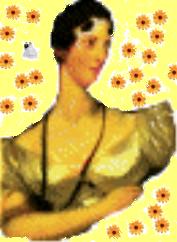 Emma
Emma
Jane Austen  Emma
Emma
I suppose that by now everyone has heard of Jane Austen, one of the most important English novel writers in the 19th century , at the latest afer the numerous cinema screenings in the last couple of years. I've seen everyone of them at least once and I love them all but I never went to see them before I hadn't read the book (at least once ).
I find it hard to tell which of Jane Austen's novels I prefer, firstly, because they are all quite similar and secondly, because I found everyone of them as thrilling as the other. Having found out that the author herself was most proud of "Emma" (first edited in 1816), however, I decided to go along with her and present this book to you.
Emma Woodhouse is the name of the novel's heroine, a young upper class woman living in the family mansion in the village of Highbury with her elderly and a bit screwed up father. As she doesn't have any regular duties, she sets her heart on "making marriages", i.e. on bringing couples together. She likes to see herself in the role of a benefactress and adopts Harriet, a young woman of unknown origin, as a friend to introduce her to society. Her first task therefore is to drive a young and honest farmer out of Harriet's mind in order to focus her ambitions on the village vicar Mr.Elton, who, however, turns out to be in love with Emma. The young woman, though, is determined to remain unmarried as she is in a situation that enables her to do this without any restrictions to her way of life, different from a poor widow and her daughter, the Bateses, whom she looks arrogantly down on.
When Emma's former governess's step-son arrives, life in Highbury becomes interesting not only because of the many balls but also because Emma believes herself to have fallen in love with him. As this proves to be untrue, she gently directs Harriet towards young Mr.Churchill, not directly interfering, though, as she has with the help of her long-time critical friend, Mr. Knightley, realized that this is not always for the best. The gentleman, however, turns out to be secretly engaged with a young woman and Emma has to learn that her tutee's love was directed towards her own good friend Mr. Knightly, whom, as she then suddenly realizes, she loves herself with all her heart.
Well, the novel wouldn't be written by
 Jane Austen if
everything didn't turn out well in the end, I assure you: The heroine gets her
(and my) hero, Mr. Knightley, Harriet returns happily to her farmer Mr. Martins
(who proves to be very worthy of her) and so everyone gets what they merit.
Jane Austen if
everything didn't turn out well in the end, I assure you: The heroine gets her
(and my) hero, Mr. Knightley, Harriet returns happily to her farmer Mr. Martins
(who proves to be very worthy of her) and so everyone gets what they merit.
"Emma" was a very scandalous book at its time, the egoistic traits of the heroine clashing with the ideal of women offering themselves and their happiness for the benefit of their families. Today, one can hardly see what was so much rejected then.
I enjoyed reading the book not only because of the romantic story (always a huge argument), but also because I find it interesting to read about the enormous social expectations and habits and the role/picture of women at the time.
Charlotte Barth | LK Englisch 2001